DISASTROUS COST OF THE VATICAN OSTPOLITIK WITH CHINA - To participate in the October 2005 Synod meetings at the Vatican, Pope Benedict XVI invited four Chinese Bishops, one from the Catholic “underground” Church faithful to Rome, and three from the “Catholic Patriotic Association” independent of Rome and controlled by the Communist regime. It would be the first time that an “underground” Bishop from China would attend a synod. In 1988, when two were invited by John Paul to attend the Synod for Asia, the Communist authority denied them authorization to leave the country. As for the others, until now it was unthinkable that “patriotic bishops” would attend any Catholic meeting, since this organization is notoriously schismatic; it elects its own “bishops” under the direction of the Chinese Communist Party.
What was the previous situation? Let me offer a brief synopsis.
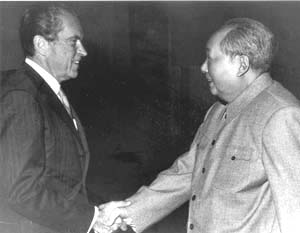
The 1972 Shanghai Declaration by Nixon and Mao Tse Tung opened the door for Chinese commercial growth. Below, Deng Xioping and Carter in Washington (1979)
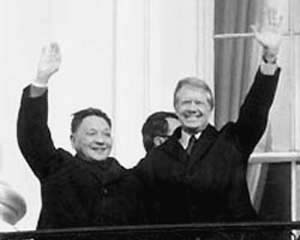
Historical photos of China, Japan Today online
|
In 1949 Mao Tse Tung took power in China and established the Communist People’s Republic of China. Almost immediately, the Catholic Church started to be persecuted by the Communist regime. In protest, the Holy See cut diplomatic ties with it and established relations with Taiwan, which became the representative of the previous Chinese republic and a haven for anti-Communist refugees. In like manner, almost all non-Communist nations established diplomatic relations with Taiwan.
In 1971 the United Nations destroyed this political situation. It invited Communist China to be member of the UN. This obliged Taiwan to leave the organization and consequently break diplomatic relations with almost all member-nations. Trying to repair that situation and maintain prestige and influence, Taiwan intensified its international commerce. It was successful in this effort and became one of the “Asian Tigers” in the vanguard of the Asian economy.
But a second blow was struck to break Taiwan in this realm as well. In the wake of the initiative making China a member of the UN, Richard Nixon and Jimmy Carter established privileged trade agreements between the United States and Communist China in the 1970s. From then on, such agreements proliferated in many countries of the West. Once again, Taiwan lost its advantages to the benefit of Communist China. These were the two frontal attacks that broke Taiwan politically and economically.
How did the Holy See face this changed panorama?
For some time it maintained the same stance de jure. But beginning in the 1980s, important Catholic Prelates started to visit China under this or that pretext, trying to build bridges with the Communist regime: Cardinal Roger Etchegaray made four trips; Cardinal Jaime Sin of Manila one, and Cardinal Godfried Daneels of Brussels one.
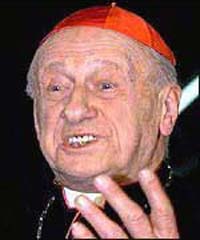
Card. Etchegaray made four trips to China - BBC, July 17, 2003
|
Hence, the de facto Vatican position changed. Instead of recognizing only one China represented by Taiwan, it started to recognize “two Chinas.”
As far as I know, this cordial policy has been unilateral. The Communist regime has never reciprocated by recognizing “two Catholic Churches,” as would be normal. Instead it continues to implacably persecute the “underground” Catholics.
Further, Beijing imposes an intransigent demand to restore relations: the Vatican must cease to recognize Taiwan. It will not tolerate the Vatican diplomacy of “two Chinas.” It has to be only “one China,” the Communist one.
In 1999, Cardinal Angelo Sodano, Secretary of State, responded to this demand, saying that the Apostolic Nuncio who currently resides in Taiwan is in fact the Vatican’s envoy to China. If the mainland government would establish diplomatic ties with Rome, he said, the nunciature would be moved from Taiwan to Beijing. (The Catholic World Report, August/September 2005).
Another Communist condition is that the Vatican must agree to never “interfere” in Chinese internal affairs. For the regime, this quite simply means that the Vatican cannot direct the Chinese Catholic Church, which it considers “interference” of a foreign State with the sovereignty of the People’s Republic.
Since April, when Benedict XVI started to occupy the Papacy, the Vatican has sent many signals indicating that it would accept the Chinese conditions. Let me list these indicators as well as some Chinese responses:
• On May 12, 2005, in his first address to the diplomatic body represented at the Vatican, Benedict XVI said that he had turned his thoughts “toward those nations with which the Holy See still does not have diplomatic relations.” He then said he would like to see them “represented before the Apostolic See as soon as possible” (www.catholic.or.kr). This statement was generally interpreted as referring principally to Communist China.
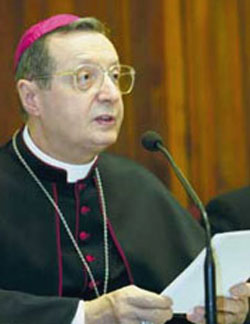
Lajolo: "No insurmountable obstacles" to restoring diplomatic ties between the Vatican and China - 30 Days, June-July 2004
|
• On June 22, Archbishop Giovanni Lajolo, the Vatican Secretary for Relations with States, told Vatican Radio that there were “no insurmountable obstacles” to establishing diplomatic relations between the Vatican and China (Catholic News Service online, September 30, 2005). “It is obvious that the Holy See recognizes the Chinese State,” he said, “although the two do not have formal diplomatic ties.” Lajolo made these statements after a trip to southern Asia. In a speech in Singapore, he declared that “the Vatican is prepared to restore diplomatic relations with China, if Beijing just guarantees religious freedom” (The Catholic World Report, August/September 2005, p. 24).
• On June 28, the government-appointed bishop Joseph Xing Wenzhi was consecrated “with the approval of the Holy See,” according to a communiqué of the Maryknoll Fathers in New York, whose superior traveled to China to attend the ceremony. Xing is supposed to be the successor of both the "patriotic" bishop of Shanghai, Aloysius Jin Luxian, and the “underground” Bishop Joseph Fan Zhongliang, faithful to Rome (National Catholic Reporter, July 15, 2005; America, July 18, 2005).
Contradicting this statement, the Office for Religious Affairs of the Communist government categorically denied that the nomination of Joseph Xing had been approved by the Vatican. “The nomination of bishop Xing is a Chinese affair and the Vatican has nothing to do with it,” it affirmed (Adista, July, 16, 2005, p. 12).
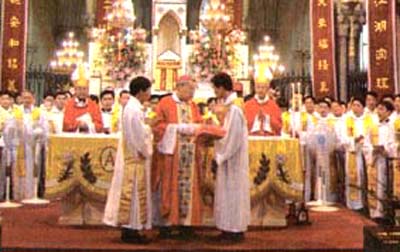
"Patriotic" bishop Jin Luxian ordains bishop Xing, approved by the Vatican and Communist China - NCR, July 15, 2005
|
Sources of Asia News agency, however, confirmed that Xing was approved by the Vatican. Catholic Bishop of Hong Kong Joseph Zen explained: “There are many cases where the Vatican and Beijing have reached agreements over the nominations of bishops. But it is normal that the government would deny this to keep everything quiet” (Adista, July 16, 2005). An anonymous Vatican source confirmed the statement, adding that “most of the other Chinese bishops who are active in the ‘official’ church have also received the approval of the Holy See” (The Catholic World Report, August/September 2005, p. 25).
• On July 4, “underground” Catholic Bishop Julius Jia Zhiguo of Zhengiding, north China, was arrested by the police. It was his sixth arrest since 2002. Bishop Jia is 70-years-old and has spent 20 years of his life in prison. The unofficial reason for his imprisonment was to prevent him from presiding over Catholic ceremonies and to oblige the faithful to attend the religious ceremonies of the “Patriotic Association” (Adista, July, 16, 2005).
Reports from Asia News verify that the “Patriotic Catholic Association” does not have the adhesion of the faithful, who boycott its activities and contest its prelates (ibid.).
• Fifty Bishops and priests of the “underground” Church remain imprisoned, according to an Asia News report. It noted that since last July the government has taken varying positions of tolerance and repression. For example, Fr. Vincent Kong Guocun was set free after nearly six years of house arrest. But 84-years-old Bishop James Lin Xili, head of the Diocese of Wenshou, remains confined to the grounds of the cathedral, where he has been under house arrest since September 1999 (The Catholic World Report, August/September 2005, p. 25).
• In early August, Benedict XVI received 28 priests and seminarians from the “Patriotic Association” in an audience at the Vatican. On that occasion, he said: “I greet with special affection the group of priests from China” (The Tablet, August 20, 2005, p. 30).
• On September 8, the Holy See issued the list of Bishops invited by Benedict XVI to attend the October Synod in Rome. The roster included three “patriotic” bishops – Anthony Li Duan of Xian, Louis Jin Luxian of Shanghai, and Luke Li Jingfend of Fengxiang – and one “underground” Catholic Bishop, Joseph Wei Jingyi of Qiqihar (Zenit, September 16, 2005).
• After three weeks of intense speculation about whether the bishops would travel or not, on September 30 Asia News and UCA News reported that Chinese authorities denied visas for the bishops to attend the synod (Catholic News Service, September 30, 2005; Le Monde online, October 1, 2005). Chairman of the “Patriotic Association” Liu Bainian criticized the Holy See for maintaining ties with Taiwan, and said it was “discourteous” to release the invitation list without consulting with Beijing first (Zenit, September 30, 2005).
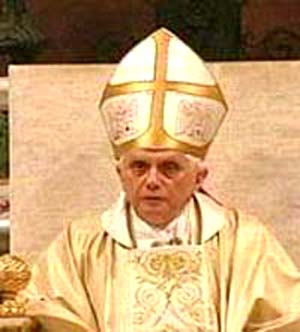
True Chinese Catholics should deny their glorious past of martyrdom and fidelity to the Pope because a Pope orders them to do so...
|
These are the facts. What should one think about them?
I distinguish two sets of consequences.
First, regarding the faithful “underground” Catholic Church, the Vatican seems to be punishing it. In effect, for 55 years those Prelates and Catholics endured every kind of physical and moral suffering because they refused to adhere to the “Patriotic Catholic Association,” directed by the Communist Party. This “underground” Church represented heroism and faithfulness to Rome; the “patriot” church represented cowardice and treason.
When Benedict XVI invited both the persecutor and persecuted bishops to attend the Synod, he implied that the two were equal in the eyes of Rome. This fact sends a strong message to the “underground Church” to change its attitude: it should give up its opposition to the Communist government, which it should accept and support. It also suggests that Catholics end their fight against the “Patriotic Catholic Association.” This is what Benedict XVI is signifying to the heroic eight million Chinese Catholics of the catacombs. They should deny their glorious past of martyrdom and fidelity to the Pope because a Pope orders them to do so…
Second, regarding the Communist regime, the Vatican is tacitly affirming that it is legitimate according to Natural Law and Catholic doctrine. This is not true, however. Communist China continues to be an illegitimate regime from both points of view. In fact, the Vatican is caving in on principles in order to achieve a practical “advantage,” a supposed “religious freedom” for Catholics in China. But what kind of “religious freedom” would this be? The government has already established the rules. Not Rome, but it, the Communist regime, should control the Catholic Church in China. That is, the Catholic Church would be subordinate to the regime. In practice, it signifies that before the regime the faithful Catholics should adopt en masse the position held by the “Patriotic Association.” Wouldn’t this be a victory for Communism? It appears so.
Further, the Holy See would have to withdraw its support for Taiwan. This implicitly represents a denial of its previous 55-year-old anti-Communist position. The regime of Taiwan – already betrayed by the UN and the US – would now be betrayed by the Holy See.
These are, in my opinion, the shameful and disastrous consequences of the present day Vatican Ostpolitik, which one can see is alive and active.

|